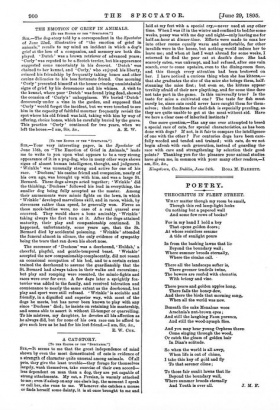[To THE EDITOR OF THE " SPECTATOR."] Sin,—Your very interesting
paper, in the Spectator of June 15th, on " The Emotion of Grief in Animals," leads me to write to you upon what appears to be a very strong appearance of it in a pug-dog, who in many other ways shows signs of almost human intelligence, thought, and judgment.
Wrinkle' was unusually strong and active for one of his race. Duchess,' his canine friend and companion, nearly of his own age, was brought up with him, and was a large St. Bernard. These dogs always acted together; Wrinkle' did the thinking, 'Duchess ' followed his lead in everything, the smaller dog being fully accepted as the master. Among their amusements were mimic fights on the lawn, in which Wrinkle' developed marvellous skill, and in races, which, by cleverness rather than speed, he generally won. Fierce as these mock-battles were, no case of a real quarrel ever occurred. They would share a bone amicably, ' Wrinkle taking always the first turn at it. After the dogs attained maturity, their play and companionship continued. It happened, unfortunately, some years ago, that the St. Bernard died by accidental poisoning. Wrinkle' attended the funeral almost in silence, the only evidence of sympathy being the tears that ran down his short nose.
The successor of Duchess' was a deerhound, Huldah,' a cheerful, playful, and gentle-tempered beast. Wrinkle' accepted the new companionship complacently, did not resent an occasional occupation of his bed, and to a certain extent trained the deerhound to assume the guardianship that the St. Bernard had always taken in their walks and excursions ; but play and romping were resented, the mimic-fights and races were over for ever. A few days later a sprightly fox- terrier was added to the family, and received toleration and countenance to nearly the same extent as the deerhound, but play and sport were still refused. Wrinkle' is sociable and friendly, in a dignified and superior way, with most of the dogs he meets, but has never been known to play with any since 'Duchess' died; he insists on retaining his mastership, and seems able to assert it without ill-temper or quarrelling. To his mistress, my daughter, he devotes all his affection as he always did, but for none of his own race can he afford to give such love as he had for his lost friend.—I am, Sir, &c., E. W. Cox.


















































 Previous page
Previous page